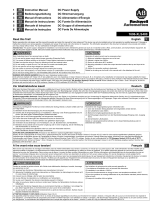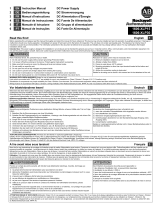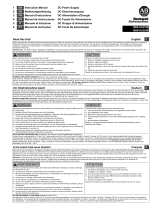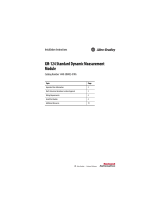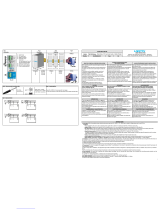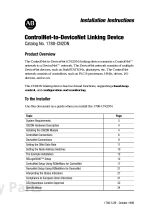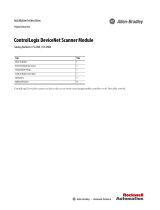La page est en cours de chargement...

1 EN DeviceNet® Series Instruction Manual DC Power Supply
2 DE DeviceNet® Series Bedienungsanleitung DC Stromversorgung
3 FR DeviceNet® Series Manual d'instructions DC Alimentation d'Énergie
4 ES DeviceNet® Series Manual de instrucciones DC Fuente De Alimentación
5 IT DeviceNet® Series Manuale di Istruzione DC Gruppo di alimentazione
6 PT DeviceNet® Series Manual de Instruções DC Fonte De Alimentação
QS5.DNET
QS10.DNET
Read this first! English 1
Before operating this unit please read this manual thoroughly and retain this manual for future reference! This device may only be installed and put into operation by qualified personnel. If damage or
malfunction should occur during operation, immediately turn power off and send unit to the factory for inspection. The unit does not contain serviceable parts. The tripping of an internal fuse (if
included) is caused by an internal defect. The information presented in this document is believed to be accurate and reliable and may change without notice. For any clarifications the English
translation will be used.
Intended Use: This power supply is designed for installation in an enclosure and is intended for general use such as in industrial control, office, communication, and instrumentation equipment. Do
not use this device in equipment, where malfunction may cause severe personal injury or threaten human life.
WARNING CAUTION
Risk of electrical shock, fire, personal injury or death.
1) Do not use the power supply without proper grounding (Protective Earth).
2) Turn power off before working on the device. Protect against inadvertent re-powering.
3) Make sure that the wiring is correct by following all local and national codes.
4) Do not modify or repair the unit.
5) Do not open the unit as high voltages are present inside.
6) Use caution to prevent any foreign objects from entering the housing.
7) Do not use in wet locations or in areas where moisture or condensation can be expected.
8) Do not touch during power-on, and immediately after power-off. Hot surfaces may cause burns.
Reduction of output current may be necessary when:
1) Minimum installation clearance can not be met.
2) Altitude is higher than 2000m.
3) Device is used above +60°C ambient.
4) Mounting orientation is other than input terminal located at the bottom and output
at the top.
5) Airflow for convection cooling is obstructed.
Details for de-rating can be found in this manual and in the datasheet of the unit..
Vor Inbetriebnahme lesen! Deutsch 2
Bitte lesen Sie diese Warnungen und Hinweise sorgfältig durch, bevor Sie das Gerät in Betrieb nehmen. Bewahren Sie die Anleitung zum Nachlesen auf. Das Gerät darf nur durch fachkundiges und
qualifiziertes Personal installiert werden. Bei Funktionsstörungen oder Beschädigungen schalten Sie sofort die Versorgungsspannung ab und senden das Gerät zur Überprüfung ins Werk. Das Gerät
beinhaltet keine Servicebauteile. Interne Sicherungen (falls vorhanden) lösen nur bei Gerätedefekt aus. Die angegebenen Daten dienen allein der Produktbeschreibung und sind nicht als
zugesicherte Eigenschaften im Rechtssinne aufzufassen. Im Zweifelsfall gilt der englische Text.
Bestimmungsgemäßer Gebrauch: Diese Stromversorgung ist für den Einbau in ein Gehäuse konzipiert und zur Verwendung für allgemeine elektronische Geräte, wie z.B. Industriesteuerungen,
Bürogeräte, Kommunikationsgeräte oder Messgeräte geeignet. Benutzen Sie dieses Gerät nicht in Steuerungsanlagen, in denen eine Funktionsstörung zu schweren Verletzungen führen oder
Lebensgefahr bedeuten kann.
WARNUNG VORSICHT
Missachtung nachfolgender Punkte kann einen elektrischen Schlag, Brände, schwere Unfälle oder Tod zur
Folge haben.
1) Betreiben Sie die Stromversorgung nie ohne Schutzleiter.
2) Schalten Sie die Eingangsspannung vor Installations-, Wartungs- oder Änderungsarbeiten ab und sichern
Sie diese gegen unbeabsichtigtes Wiedereinschalten.
3) Sorgen Sie für eine ordnungsgemäße und fachgerechte Verdrahtung.
4) Führen Sie keine Änderungen oder Reparaturversuche am Gerät durch.
5) Gerät niemals öffnen. Im Inneren befinden sich gefährliche Spannungen.
6) Verhindern Sie das Eindringen von Fremdkörpern, wie z.B. Büroklammern und Metallteilen.
7) Betreiben Sie das Gerät nicht in feuchter Umgebung oder in einer Umgebung, bei der mit Betauung oder
Kondensation zu rechnen ist.
8) Gehäuse nicht während des Betriebes oder kurz nach dem Abschalten berühren. Heiße Oberflächen
können Verletzungen verursachen.
Rücknahme der Ausgangsleistung kann erforderlich sein:
1) wenn die minimalen Einbauabstände nicht eingehalten werden können.
2) bei Aufstellhöhen über 2000m.
3) Betrieb bei Umgebungstemperaturen über +60°C.
4) bei Einbaulagen abweichend von der Standardeinbaulage (Eingang unten,
Ausgang oben).
5) bei behinderter Luftzirkulation.
Details zur Leistungsrücknahme befinden sich in dieser Betriebsanleitung oder im
Datenblatt des Gerätes.
A lire avant mise sous tension! Français 3
Merci de lire ces instructions de montage et d'entretien avant de mettre l'alimentation sous tension. Conservez ce manuel qui vous sera toujours utile. Cette alimentation doit être installée par du
personnel qualifié et compétent. Le déclenchement du fusible interne traduit très probablement un défaut au niveau de l'appareil. Si un défaut quelconque apparaît en cours de fonctionnement,
débrancher au plus vite l'alimentation. Dans ce deux cas de figure, il convient de faire contrôler l'alimentation en usine! Les données indiquées dans ce document servent uniquement à donner une
description du produit et n'ont aucune valeur juridique. En cas de divergences, le texte anglais fait foi.
Utilisation: Cet appareil est conçu pour être installé dans une armoire et pour tous les équipements électroniques, tel que l'équipement industriel de commande, l'équipement de bureau, le matériel
de communication et les instruments de mesures. N'utilisez pas cet appareil sur des installations dans lesquels un problème de fonctionnement de l'alimentation pourrait causer des blessures graves
ou menacer la vie humaine.
AVERTISSEMENT ATTENTION
Prendre en compte les points suivants, afin d'éviter toute détérioration électrique, incendie, dommage aux
personnes ou mort.
1) ne jamais faire fonctionner l'alimentation sans raccordement à la terre !
2) débrancher l'installation avant toute intervention sur l'alimentation (ou démontage) et s'assurer qu'il n'y a
pas risque de redémarrage.
3) s'assurer que le câblage a été fait selon les prescriptions
4) ne pas effectuer de réparations ou modifications sur l'alimentation
5) ne pas ouvrir l'appareil. Des tensions importantes passent à l'intérieur.
6) veiller à ce qu'aucun objet ne rentre en contact avec l'intérieur de l'alimentation (trombones, pièces
métalliques)
7) ne pas faire fonctionner l'appareil dans un environnement humide ou à l'extérieur, non protégé. Ne pas
utiliser l'appareil dans un environnement où il peut y avoir de la condensation.
8) ne pas toucher le carter pendant le fonctionnement ou après la mise sous tension. Surface chaude
risquant d’entraîner des blessures.
Des limitations de puissance de sortie peuvent apparaître si :
1) les distances d'installation mini. ne peuvent être observées
2) installation à une altitude > 2000 m
3) pour des fonctionnements en charge et avec une température ambiante > 60°C
4) pour des positions de montage différentes de la préconisation standard (entrée
dessous, sortie en haut).
5) lorsque la circulation d'air est gênée
D'autres informations sont disponibles dans la documentation de mise en service

Lea primero! Español 4
Conserve este manual como referencia para futuras consultas. La fuente de alimentación solo puede ser instalada y puesta en funcionamiento por personal cualificado. Por favor lea detenidamente
este manual antes de conectar la fuente de alimentación. Cuando se funde un fusible interno, existe gran probabilidad de un fallo interno en el equipo.Si se produce un fallo o mal funcionamiento
durante la operación, desconecte inmediatamente la tensión de alimentación. En ambos casos, el equipo debe ser inspeccionado en fábrica. La información presentada en este documento es
exacta y fiable en cuanto a la descripción del producto y puede cambiar sin aviso. En casa de duda, prevalece el texto inglés.
Uso apropiado: Este equipo ha sido diseñado para su instalación en un ambiente cerrado y ha sido concebido para uso general en instalaciones de control industrial, oficinas, comunicaciones y
equipos de instrumentación. No emplee esta unidad en equipos, donde un mal funcionamiento puede ocasionar lesiones graves o riesgo mortal.
ADVERTENCIA ATENCIÓN
Riesgo de descarga eléctrica, incendio, accidente grave o muerte.
1) No conectar nunca la unidad sin conexión de puesta a tierra.
2) Desconectar la tensión de red antes de trabajar en la fuente de alimentación. Evite una posible reconexión
involuntaria.
3) Asegurarse de que el cableado es correcto de acuerdo a los códigos locales y nacionales.
4) No realizar ninguna modificación o reparación de la unidad.
5) No abrir nunca la unidad. En el interior existe riesgo de altas tensiones.
6) Evitar la introducción en la carcasa de objetos extraños.
7) No usar el equipo en ambientes húmedos. No operar el equipo en ambientes donde se espere la
formación de rocío o condensación.
8) No tocar durante el funcionamiento ni inmediatamente después del apagado. El calor de la superficie
puede causar quemaduras graves
La deriva en la tensión de salida se produce:
1) cuando no pueden mantenerse las distancias mínimas de montaje.
2) en caso de que el montaje se realice en altitudes superiores a los 2000 m.
3) en caso de funcionamiento a plena carga y temperaturas ambientales superiores
a +60ºC.
4) en caso de posiciones de montaje diferentes a la posición de montaje estándar
(terminales de entrada abajo y terminales de salida arriba).
5) en caso de que la circulación de aire para la refrigeración por conducción esté
obstruida.
Puede encontrar más detalles del caso de deriva en este manual.
Leggere prima questa parte! Italiano 5
Prima di collegare il sistema di alimentazione elettrica si prega di leggere attentamente le seguenti avvertenze. Conservare le istruzioni per la consultazione futura. Il sistema di alimentazione elettrica
deve essere installato solo da personale competente e qualificato. In caso di intervento del fusibile interno, molto probabilmente l'apparecchio è guasto. Se durante il funzionamento si verificano
anomalie o guasti, scollegare immediatamente la tensione di alimentazione. In entrambi i casi è necessario far controllare l'apparecchio dal produttore! I dati sono indicati solo a scopo descrittivo del
prodotto e non vanno considerati come caratteristiche garantite dell'apparecchio.In caso di differenze o problemi è valido il testo inglese
Uso previsto: Questo apparecchio è previsto per il montaggio in un rack per moduli elettronici, ad esempio per controllori industriali, apparecchiature per ufficio, unità di comunicazione o apparecchi
di misura. Non utilizzare questo apparecchio in apparati o impianti dove il malfunzionamento può causare danni alla persona o pericolo di vita.
AVVERTENZA ATTENZIONE
Il mancato rispetto delle seguenti norme può provocare folgorazione elettrica, incendi, gravi incidenti e perfino
la morte.
1) Non far funzionare in nessun caso il sistema di alimentazione elettrica senza conduttore di protezione!
2) Prima di eseguire interventi di installazione, di manutenzione o di modifica scollegare la tensione di rete ed
adottare tutti i provvedimenti necessari per impedirne il ricollegamento non intenzionale.
3) Assicurare un cablaggio regolare e corretto.
4) Non tentare di modificare o di riparare da soli l'apparecchio.
5) Non aprire l'apparecchio. Al suo interno sono applicate tensioni elettriche pericolose.
6) Impedire la penetrazione di corpi estranei nell'apparecchio, ad esempio fermagli o altri oggetti metallici.
7) Non far funzionare l'apparecchio in un ambiente umido. Non far funzionare l'apparecchio in un ambiente
soggetto alla formazione di condensa o di rugiada.
8) Non toccare quando acceso e subito dopo lo spegnimento. La superficie calda può causare scottature.
È necessario ridurre la potenza di uscita se:
1) non è possibile rispettare le distanze minime di montaggio;
2) l'apparecchio viene installato in un luogo di altitudine maggiore di 2000 m;
3) il funzionamento è a pieno carico a temperatura ambiente maggiore di +60°C;
4) la posizione di montaggio differisce da quella standard (ingresso in basso, uscita
in alto).
5) è ostacolata la libera circolazione dell'aria.
Ulteriori informazioni sono riportate in questo manuale.
Leia primeiro! Portuguès 6
Recomendamos a leitura cuidadosa das seguintes advertências e observações, antes de colocar em funcionamento a fonte de alimentação. Guarde as Instruções para futura consulta, em casos de
dúvida. A fonte de alimentação deverá ser instalada apenas por profissionais da área, tecnicamente qualificados. Se o fusível interno se fundir, é grande a possibilidade de existir um defeito no
aparelho. Se por acaso, durante a utilização ocorrer algum defeito de funcionamento ou dano, desligue imediatamente a tensão de alimentação. Em ambos os casos, será necessária uma
verificação na Fábrica! Os dados mencionados têm como finalidade somente a descrição do produto, e não devem ser interpretados como propriedades garantidas no sentido jurídico. Em caso de
duvidas aplica-se o texto em inglês.
Utilize: Este aparelho foi concebido para ser montado dentro de invólucros, caixas ou armários para aparelhos eletrônicos em geral, como, por exemplo, comandos de instalações industriais,
aparelhos para escritórios, aparelhos de comunicação ou instrumentos de medida e quadros eléctricos. Não utilize este aparelho em instalações, nos quais um defeito de funcionamento poderá
causar danos graves ou significar risco de morte.
ATENÇÃO CUIDADO
A não observância ou o incumprimento dos pontos a seguir mencionados, poderá causar uma descarga
elétrica, incêndios, acidentes graves ou morte.
1) Não use a fonte de alimentação sem o condutor de proteção terra!
2) Antes de trabalhos de instalação, manutenção ou modificação, desligue a tensão de alimentação,
protegendo-a contra uma nova ligação involuntária.
3) As ligações devem ser efectuadas apenas por profissionais competentes.
4) Não efectue nenhuma modificação ou tentativa de reparação no aparelho. Quando necessário contacte o
seu distribuidor.
5) Não abra o aparelho mesmo quando desligado. No seu interior existem condensadores que podem estar
carregados electricamente.
6) Proteger a fonte de alimentação contra a introdução inadvertida de corpos metálicos, como por ex., clipes
ou outras peças de metal.
7) Não usar o aparelho em ambientes húmidos. Não usar o aparelho em ambientes propensos a
condensações.
8) Não tocar enquanto estiver em funcionamento, nem após a desligar. A superficie poderá estar quente e
provocar lesões.
Será necessário reduzir a potência de saída nos seguintes casos:
1) Quando não forem observadas as distâncias mínimas de montagem.
2) Quando instaladas a altitudes superiores a 2000m.
3) Existencia de temperatura ambiente superior a +60ºC, em plena carga do
aparelho.
4) Montagem invertida do aparelho (Entrada em baixo, saída em cima).
5) Montagem em ambiente sem ventilação.
No presente manual de funcionamento encontram-se ainda outras informações.
Germany +49 89 9278 0 www.pulspower.de
China +86 512 62881820 www.pulspower.cn
France +33 478 668 941 www.pulspower.fr
North America +1 630 587 9780 www.pulspower.us
Austria +43 27 64 32 13 www.pulspower.at
Singapore +65 6684 2310 www.pulspower.sg
Switzerland +41 56 450 18 10 www.pulspower.ch
United Kingdom +44 845 130 1080 www.pulspower.co.uk
Headquarters:
PULS GmbH
Arabellastrasse 15
D-81925 Munich
Germany
www.pulspower.com

DeviceNET® Power Supply Instruction Manual
Bedienungsanleitung für DeviceNET® Stromversorgung
Technical Data 1) Technische Daten
1) QS5.DNET QS10.DNET
Output Voltage Ausgangsspannung nom. DC 24.1V DC 24-24.5V
Factory Setting 6) Werkseinstellung
6) typ. fixed / fest eingestellt 24.1V
Output Current Ausgangsstrom nom. 3.8A 8A
Output Power Ausgangsleistung PowerBoost 2) 91.2W 196W
NEC Power Classifikation Klassifizierung nach NEC -NEC Class 2 NEC Class 1
Output Ripple & Noise Voltage 3) Ausgangswelligkeit
3) max. 50mVpp 50mVpp
Line Regulation 2) Netzausregelung
2) max 0.1% 0.1%
Load Regulation 5) Lastausregelung
5) max 0.3% 0.3%
Temperature Coefficient Temperaturgang typ. 0.03% / °C 0.03% / °C
Turn-on Time Einschaltzeit typ. 100ms 85ms
Turn-on Delay Einschaltverzögerung typ. 200ms 600ms
Turn-on Overshoot Überschwingen beim Einschalten max. 400mV 400mV
AC Input Voltage AC Eingangsspannung nom. AC 100-240V -15/+10% AC 100-240V ±15%
Input Frequency Eingangsfrequenz nom. 50-60Hz ±6% 50-60Hz ±6%
AC Input Current 6) AC Eingangsstrom
6) typ. 0.85A / 0.48A 1.77A / 1.0A
Power Factor 6) Leistungsfaktor
6) typ. 0.98 / 0.90 0.98 / 0.92
Allowed Voltage L or N to Earth Erlaubte Spannung L oder N zu Erde max. 300Vac 300Vac
EN 61000-3-2 EN 61000-3-2 PFC-Norm Yes / Ja Yes / Ja
Input Inrush Current 4) Einschaltspitzenstrom
4) typ. 11A peak 7A peak
Hold-up Time 6) Pufferzeit
6) typ. 44 / 85ms 33 / 34ms
Efficiency 6) Wirkungsgrad
6) typ. 91.4 / 92.0% 92.3 / 92.7%
Power Losses 6) Verlustleistung
6) typ. 8.6 / 7.9W 16.0 / 15.1W
Operational Temperature Range Betriebstemperaturbereich nom. -25°C - +70°C -25°C - +70°C
Output Derating Leistungsrücknahme 60°C … 70°C 2W/°C 5W/°C
Storage Temperature Range Lagertemperaturbereich nom. -40°C - +85°C -40°C - +85°C
Humidity 8) Feuchte
8) IEC 60068-2-30 5 - 95% r.H. 5 - 95% r.H.
Vibration Schwingen IEC 60068-2-6 2g 2g
Shock Schocken IEC 60068-2-27 30g 6ms, 20g 11ms 30g 6ms, 20g 11ms
Degree of Pollution (not conductive) Verschmutzungsgrad (nicht leitend) EN 50178 / 62103 2 2
Degree of Protection Schutzart EN 60529 IP20 IP20
Class of Protection Schutzklasse IEC 61140 I 9) I 9)
Over-temperature Protection 10) Übertemperaturschutz
10) OTP Yes / Ja Yes / Ja
Output Over-voltage Protection 10) Überspannungsschutz Ausgang
10) OVP, max. 29Vdc 29.5Vdc
Leakage Current 11) TN, TT-mains
IT-mains PE- Ableitstrom 11) TN, TT-Netze
IT-Netze max.
max. 0.22mA / 0.4mA
0.49mA / 0.88mA 0.38mA / 0.74mA
0.79mA / 1.29mA
Return Voltages Resistance 12) Rückspeisefestigkeit
12) max. 28Vdc 35Vdc
Dimensions 15) (WxHxD) Abmessungen
15) (BxHxT) nom. 40x124x117mm 60x124x117mm
Weight Gewicht max. 620g; 1.37lb 900g; 1.98lb
1) All parameters are specified at 230Vac, nominal output current, 25°C ambient and after a 5 minutes
run-in time unless otherwise noted.
2) Input voltage variation between 85Vac and 264Vac and full loaded output.
3) 50-Ohm measurement, bandwidth 20MHz
4) Input inrush current is electronically limited and temperature independent.
5) Load deviations from no-load full-load
6) At nominal load and 120Vac / 230Vac input voltage.
7) Not used
8) Do not energize while condensation is present.
9) PE connection required (Ground).
10) Output shut-down with automatic restart attempts.
11) PE Leakage current at 132Vac, 60Hz / 264Vac, 50Hz
12) Loads such as decelerating motors and inductors can feed voltage back to the output of the
power supply. The figure represents the maximum allowed feed back voltage
13) Including an external 7000µF capacitor
14) Time between turn-on and 23V output voltage
15) Depth without DIN-rail.
1) Alle Werte gelten bei 230Vac, Nennausgangsstrom, 25°C Umgebung und nach einer
Aufwärmzeit von 5 Minuten, wenn nichts anderes angegeben ist.
2) Eingangsspannungsänderungen zwischen 85Vac und 264Vac, Ausgang voll belastet.
3) 50-Ohm Messung, Bandbreite 20MHz
4) Der Einschaltstromstoß ist elektronisch begrenzt und temperaturunabhängig.
5) Lastwechsel von Leerlauf bis Volllast
6) Bei Nominallast und 120Vac / 230Vac Nenneingangsspannung.
7) Nicht benutzt
8) Nicht betreiben, solange das Gerät Kondensation aufweist.
9) PE Verbindung erforderlich.
10) Ausgang schaltet ab und macht regelmäßig automatische Startversuche.
11) Erd-Ableitstrom bei 132Vac, 60Hz / 264Vac, 50Hz
12) Bremsende Motoren oder Induktivitäten können Spannung zum Ausgang des Netzteils
rückspeisen. Der Wert gibt die max. zulässige Rückspeisespannung an.
13) Mit angeschlossenen externen zusätzlichem 7000µF Kondensator
14) Zeit zwischen Einschalten und Erreichen von 23V Ausgangsspannung
15) Tiefe ohne DIN-Schiene
Installation
The unit is suitable for TN, TT and IT mains. Use DIN-rails according to EN 60715 or EN 50022
with a height of 7.5 or 15mm. Mounting orientation must be output terminals on the top and input
terminals on the bottom. For other orientations see datasheet. Do not obstruct air flow as the unit
is convection cooled. Ventilation grid must be kept free of any obstructions. The following
installation clearances must be kept when power supplies are permanently loaded with more than
50% of the nominal current:
Left / right: 5mm (15mm in case the adjacent device is a heat source)
40mm on top, 20mm on the bottom of the unit.
Use in hazardous location areas
Units which are marked with "Class I Div 2" are suitable for use in Class I Division 2 Groups A, B,
C, D locations.
WARNING EXPLOSION HAZARDS!
Substitution of components may impair suitability for this environment. Do not disconnect the unit
or operate the voltage adjustment unless power has been switched off or the area is known to be
non-hazardous. A suitable enclosure must be provided for the end product which has a minimum
protection of IP54 and fulfils the requirements of the EN 60079-15:2010.
Installation
Das Gerät ist für TN, TT und IT-Netze geeignet. Geeignet für DIN-Schienen entsprechend EN
60715 oder EN 50022 mit einer Höhe von 7,5 oder 15mm. Der Einbau hat so zu erfolgen, dass
der Eingang sich unten und die Ausgang sich oben befindet. Für andere Einbaulagen siehe
Datenblatt. Luftzirkulation nicht behindern! Die Geräte sind für Konvektionskühlung ausgelegt. Es
ist für ungehinderte Luftzirkulation zu sorgen. Folgende Einbauabstände werden bei dauerhafter
Belastung >50% des Nennstromes empfohlen:
Links / rechts: 5mm (15mm bei benachbarten Wärmequellen)
Oben: 40mm, unten 20mm vom Gerät.
Betrieb in explosionsgefährdeter Umgebung
Geräte, die mit "Class I Div 2" gekennzeichnet sind, sind für den Einsatz in Klasse I Division 2
Gruppen A,B,C,D Umgebung geeignet.
ACHTUNG EXPLOSIONSGEFAHR!
Veränderungen am Gerät können die Tauglichkeit für diese Umgebung beeinträchtigen.
Anschlüsse nicht abklemmen und Spannungseinstellung nicht verändern, solange Spannung
anliegt oder die Umgebung als explosionsgefährlich gilt. Das Gerät muss mindestens in ein IP54
Gehäuse, welches den Anforderungen der EN 60079-15:2010 entspricht, eingebaut werden.
Input Fuses
Internal input fuse included, not user accessible. The QS5.DNET is tested and approved for
branch circuits up to 30A (UL) and 32A (IEC). The QS10.DNET is tested and approved for branch
circuits up to 20A.An external protection is only required if the supplying branch has an ampacity
greater than this, however, in some countries local regulations might apply. Check local codes and
requirements. If an external fuse is necessary or utilized, minimum requirements need to be
considered to avoid nuisance tripping of the circuit breaker.
QS5.DNET: 6A B- or 3A C-Characteristic; QS10.DNET: 6A B- or 4A C-Characteristic
Sicherungen am Eingang
Das Gerät besitzt eine eingebaute Eingangssicherung, die nicht anwenderzugänglich ist. Das
QS5.DNET ist geprüft und zugelassen zum Anschluss an Stromkreisen bis max. 30A (UL) und
32A (IEC), das QS10.DNET bis zu max. 20A. Ein zusätzlicher externer Schutz ist nur erforderlich,
wenn der Speisestromkreis mit einem höheren Wert abgesichert ist oder nationale Richtlinien es
vorschreiben. Falls externe Schutzelemente verwendet werden, sollen diese nicht kleiner als
folgende Werte sein, um ein fehlerhaftes Auslösen zu vermeiden:
QS5.DNET: 6A B- oder 3A C-Charakteristik; QS10.DNET: 6A B- oder 4A C-Charakteristik
CE Marking
CE mark is in conformance with EMC directive 2004/108/EC, the low-voltage directive (LVD)
2006/95/EC and the RoHS directive 2011/65/EU.
EMC Immunity: EN 61000-6-1, EN 61000-6-2
EMC Emission EN 61000-6-3, EN 61000-6-4, FCC Part 15 Class B
CE Kennzeichnung
Das CE Zeichen ist angebracht und erklärt die Erfüllung der EMV Richtlinie 2004/108/EG, der
Niederspannungsrichtlinie 2006/95/EG und der RoHS Richtlinie 2011/65/EU.
Störfestigkeit: EN 61000-6-1, EN 61000-6-2
Störaussendung: EN 61000-6-3, EN 61000-6-4, FCC Part 15 Klasse B

DeviceNET® Power Supply Instruction Manual
Bedienungsanleitung für DeviceNET® Stromversorgung
Terminals and Wiring
Use appropriate copper cables that are designed for a minimum operating temperature of:
60°C for ambient temperatures up to 45°C,
75°C for ambient temperatures up to 60°C and
90°C for ambient temperatures up to 70°C.
Follow national installation codes and regulations! Ensure that all strands of a stranded wire enter
the terminal connection! Ferrules are allowed.
QS5.DNET:
Input: Solid wire / Stranded wire / AWG 0.5-6mm2 / 0.5-4mm2 / 20-10 AWG
Wire stripping length 7mm / 0.28inch
Output and Signals: Solid wire / Stranded wire / AWG 0.3-4mm2 / 0.3-2.5mm2 / 26-12 AWG
Wire stripping length 6mm / 0.25inch
QS10.DNET: Solid wire / Stranded wire / AWG 0.5-6mm2 / 0.5-4mm2 / 20-10 AWG
Wire stripping length 7mm / 0.28inch
Anschlussklemmen und Verdrahtung
Verwenden Sie geeignete Kupferkabel, die mindestens für:
60°C bei einer Umgebungstemperatur bis zu 45°C,
75°C bei einer Umgebungstemperatur bis zu 60°C und
90°C bei einer Umgebungstemperatur bis zu 70°C zugelassen sind.
Beachten Sie nationale Bestimmungen und Installationsvorschriften! Stellen Sie sicher, dass keine
einzelnen Drähte von Litzen abstehen. Aderendhülsen sind erlaubt.
QS5.DNET:
Eingang: Starrdraht / Litze / AWG 0,5-6mm2 / 0,5-4mm2 / 20-10 AWG
Abisolierlänge 7mm / 0,28inch
Ausgang, Signale: Starrdraht / Litze / AWG 0,3-4mm2 / 0,3-2,5mm2 / 26-12 AWG
Abisolierlänge 6mm / 0,25inch
QS10.DNET: Starrdraht / Litze / AWG 0,5-6mm2 / 0,5-4mm2 / 20-10 AWG
Abisolierlänge 7mm / 0,28inch
Output- and Overload Characteristic (see Fig. 4 and 5)
The units are overload, no-load, short-circuit proof. At overload, the output current flows
continuously. The unit does not switch-off or hiccup at overload.
Ausgangs- und Überlastverhalten (siehe Bild 4 und 5)
Die Geräte sind leerlauf-, überlast- und kurzschlussfest. Bei Überlast fließt kontinuierlich Strom.
Die Geräte schalten nicht ab und haben auch keinen „Hiccup“ Modus.
DC-OK Relay Contact (see Fig. 6)
This feature monitors the output voltage, which is produced by the power supply, and is
independent of a return voltage from a unit which is connected in parallel.
Contact closes when the output voltage reaches 21.5V
Contact opens when the output voltage dips more than 10%. Short dips will be extended to a
length of 250ms. Dips shorter than 1ms will be ignored.
Contact ratings: max.: 60Vdc 0.3A, 30Vdc 1A, 30Vac 0.5A, Resistive load, min.: 1mA
DC-OK Relais Kontakt (siehe Bild 6)
Diese Funktion überwacht die vom Gerät erzeugte Ausgangsspannung und lässt sich von einer
rückwärts eingespeisten Spannung nicht beeinflussen (z.B.: bei Parallelschaltung)
Kontakt schließt sobald die Ausgangsspannung 21,5V erreicht
Kontakt öffnet sobald der Ausgang um mehr als 10% einbricht. Kurze Einbrüche werden auf
250ms verlängert. Einbrüche kürzer 1ms werden ignoriert.
Belastbarkeit: max.: 60Vdc 0,3A; 30Vdc 1A; 30Vac 0,5A; (R-Last); min.: 1mA
Dielectric Strength (see Fig. 1)
The output voltage is floating and separated from the input according to SELV (IEC/EN 60950-1)
and PELV (EN 60204-1, EN 50178; IEC 62103, IEC 60364-4-41) requirements. Type and factory
tests are conducted by the manufacturer. Field tests may be conducted in the field using the
appropriate test equipment which applies the voltage with a slow ramp (2s up and 2s down).
Connect phase and neutral together as well as all output poles before the test is conducted.
A B C D
Type Test (60s) 2500Vac 3000Vac 500Vac 500Vac
Factory Test (5s) 2500Vac 2500Vac 500Vac 500Vac
Field Test (5s) 2000Vac 2000Vac 500Vac 500Vac
Cut-off current setting >10mA >10mA >20mA >1mA
Isolationsfestigkeit (siehe Bild 1)
Die Ausgangsspannung hat keinen galvanischen Bezug zur Erde oder Schutzleiter und ist zum
Eingang nach den SELV (IEC/EN 60950-1) und PELV (EN 60204-1, EN 50178, IEC 62103, IEC
60364-4-41) Standards getrennt. Typ- und Stückprüfungen werden beim Hersteller durchgeführt.
Wiederholungsprüfungen dürfen mittels geeigneten Prüfgenerators mit langsam (2s) ansteigenden
und abfallenden Spannungsrampen in der Anwendung erfolgen. Vor den Tests sind Phase und
Neutralleiter wie auch alle Ausgangspole miteinander zu verbinden.
A B C D
Typprüfung (60s) 2500Vac 3000Vac 500Vac 500Vac
Stückprüfung (5s) 2500Vac 2500Vac 500Vac 500Vac
Wiederholungsprüfung (5s) 2000Vac 2000Vac 500Vac 500Vac
Strom- Abschaltschwelle >10mA >10mA >20mA >1mA
Fig. 1 / Bild 1
Insulation / Isolation Fig. 2 / Bild 2
QS5.DNET: Functional Diagram / Funktionsschaltbild Fig. 3 / Bild 3
QS10.DNET: Functional Diagram / Funktionsschaltbild
AD
C
B
B
Input DC-ok
Earth Output
-
+
N
L
+
+
-
-
DC-ok
contact
Output
Over-
Voltage
Protection
PFC
Converter
Output
Voltage
Regulator
Power
Converter Output
Filter
DC-ok
Relay
Output
Voltage
Monitor
Output
Power
Manager
Temper-
ature
Shut-
down
Overload
lamp
DC-ok
lamp
Input Fuse
Input Filter
Input Rectifier
Active Transient Filter &
Inrush Current Limiter
L
N
+
+
-
-
DC-ok
contact
Output
Over-
Voltage
Protection
PFC
Converter
Output
Voltage
Regulator
Power
Converter Output
Filter
DC-ok
Relay
Output
Voltage
Monitor
Output
Power
Manager
Temper-
ature
Shut-
down
Overload
lamp
DC-ok
lamp
Input Fuse
Input Filter
Input Rectifier
Active Transient Filter &
Inrush Current Limiter
V
OUT
L
N
Fig. 4 / Bild 4
QS5.DNET: Overload Characteristic / Überlastverhalten Fig. 5 / Bild 5
QS10.DNET: Overload Characteristic / Überlastverhalten Fig. 6 / Bild 6
DC-OK Signal
Output Voltage
001 345A
4
8
12
28V
16
20
24
2
Output Current
Output Voltage
002 6810A
4
8
12
28V
16
20
24
4
Output Current
250ms
21.5V
<1ms
open
24V
openclosed closed
>1ms
Fig. 7 / Bild 7 Physical Dimensions / Abmessungen
QS5.DNET QS10.DNET
PU-348.010.06-10E
/

